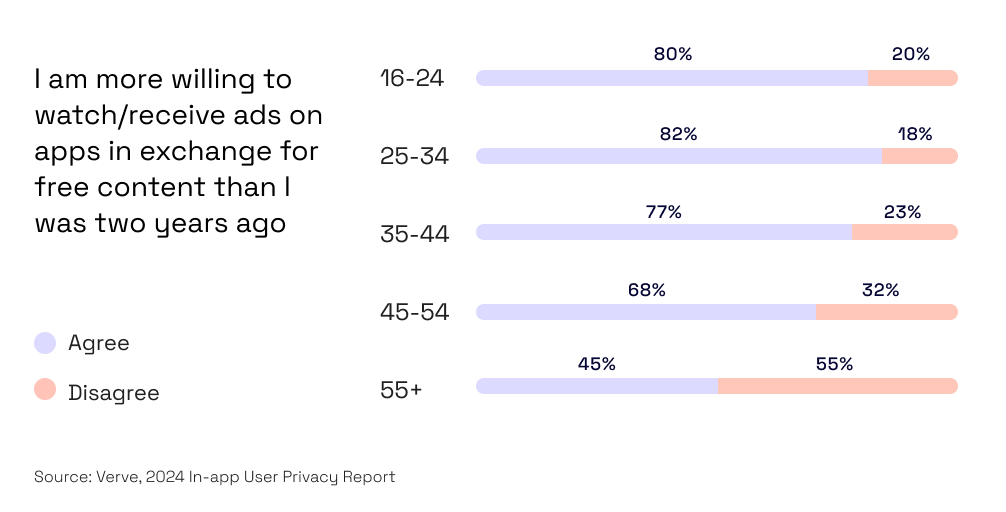A combination of assumptions and past studies has labeled baby boomers as technically unsavvy and disengaged when it comes to advertising, with only 12% globally expressing positive feelings about advertisements. However, there is growing evidence suggesting that they have been incorrectly categorized.
Online proficiency among baby boomers is not nearly as limited as “silver surfer” stereotypes imply. Consumers aged 55 and above have increased their consumption of digital media and spent an increasingly significant amount of time on social applications. According to our most recent study, this age group’s primary challenge with connected activity may actually be a more skeptical attitude toward online privacy. This is evident in the finding that a net 65% are less prepared to share their data now compared to two years ago.
While there is substantial potential to engage this misjudged generation, it is evident that mobile marketers seeking to gain the trust of baby boomers must proceed with caution. They must ensure that ad experiences provide the appropriate combination of tailored value and stringent data protection.
Well-seasoned in media dynamics
Boomers, who are both digitally active and aware of the crucial role ads play in supporting mobile apps, are willing to participate in this exchange of value. However, our research indicates that their willingness to participate is growing at a slower pace compared to younger cohorts. Since 2022, the percentage of Boomers who have become more willing to view ads in exchange for free content has increased from just under three-fifths (55%) to 80% of 16–24-year-olds.

Much of this reluctance stems from the fact that mature consumers have witnessed the media landscape evolve firsthand. With a comprehensive understanding of the transition from predominantly paid, branded ads in traditional print and TV to multi-channel campaigns and user-generated content, boomers are well-versed in how the online ecosystem operates.
While boomers acknowledge the value of ads and the benefits they offer, it’s likely that many have formed a set notion of their willingness to trade attention for advantages that remain relatively stable. Moreover, their longstanding familiarity has sharpened their discernment regarding the data collection practices that often underpin mobile ads.
A solid grasp of growing data risks
Continued efforts by regulators and technology leaders to enhance data safeguards haven’t gone unnoticed by boomers. In fact, 49% of respondents aged 55 and above express a growing trust in data sharing due to improved control over in-app privacy. However, the data also reveals that increased optimism about data openness hasn’t translated into practical application.
When asked which types of apps they are most inclined to share their data with, including shopping, social, and travel apps, half (50%) of boomers didn’t show a particular preference for any category. Moreover, seven in ten (71%) of boomers feel reluctant to provide all forms of personal data covered by the survey. This contrasts sharply with Gen Z, where consumers in the 16-24 bracket are twice as likely as boomers to share their birthdate, age, and mobile number across various app types.
Again, the reasoning behind these behaviors appears to stem from extensive knowledge.
Over half of our boomer respondents (56%) express greater concern today about unauthorized parties gaining access to their data, cyber-attacks (55%), and identity theft (54%) compared to two years ago. This suggests that boomers have a strong understanding of persistent and emerging data risks, which is driving significant anxiety.
Furthermore, higher concerns are creating a complex relationship with data-driven ads. While a further 55% of boomers are less likely to pay to remove interesting and well-targeted ads, 42% also frequently refrain from engaging with ads due to privacy concerns.
High demand for enhanced clarity
Addressing the complex expectations and considerations of boomers is a challenging task, but there are several indicators that suggest the best course of action. Surprisingly, the primary responsibility for alleviating data concerns appears to fall on app publishers. Boomers are particularly eager for publishers to provide deeper transparency into how their data is managed and utilized (at 97%, compared to a 95% overall average).
However, the need for action on the brand side is equally pressing. At the minimum, marketers must carefully select publisher partners and prioritize those who are committed to meeting the essential prerequisites for earning consumer trust. These include robust data defenses, diverse sharing options, and consent requests that clearly outline the specific collection purposes, as well as the use and storage processes.
In the long run, it is becoming increasingly important to explore ad tailoring approaches that align with the growing trend towards heightened digital privacy and boomers’ strong emphasis on strict data security. By leveraging inherently ID-less advertising inventory, marketers can address concerns about data handling and potential misuse by driving ad targeting using a combination of anonymized data signals instead of personal behavioral data.
Furthermore, adopting this approach will have the added benefit of appealing to the strong preference of many boomers for ads that match their surroundings and tendency to switch off from those that don’t. A significant portion of boomers (60%) find ads most appealing when placed in an appropriate context, and almost the same number (almost 70%) are more likely to engage with them. In contrast, just over three-quarters (76%) are actively turned off by ill-fitting ads.
Boomers may seem reluctant, but they are not in the way we might expect. Far from being out of touch with today’s media landscape, they have an increasingly strong preference for cross-environment content and a keen desire for detailed oversight of how ads function. Instead of simply converting them to digital, the greatest challenges for mobile marketers seeking to win over boomers will involve not only dispelling outdated misconceptions but also enhancing their own understanding of what discerning mature consumers value and the ability to deliver it: a better balance of privacy and relevance.








